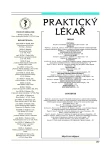-
Medical journals
- Career
The profile of risk factors in a selected series of patients suffering hypertension, in the offices of general practitioners, and the effectiveness and tolerability of the therapeutic strategy including rilmenidine. Results of the second and third stages of the DRIVE survey
Authors: J. Widimský 1; Sachovám. 2; V. Lánská 3
Authors‘ workplace: Klinika kardiologie IKEM, Praha 1; Servier, s. r. o., Praha 2; Úsek náměstka pro odbornou činnost IKEM, Praha 3
Published in: Prakt. Lék. 2005; 85(5): 261-267
Category: Reviews
Overview
The DRIVE survey was organized in the Czech Republic in the offices of 119 general practitioners from April 2004 through June 2004. In total, 1156 patients with diagnosis of hypertension were included. The first phase of the DRIVE survey was looking at the main cardiovascular risk factors and the concomitant treatment, the 2nd phase was evaluating the acceptability and effect of antihypertensive treatment with added rilmenidine – performed as a nonintervention clinical evaluation in patients, where adaptation of the antihypertensive treatment was necessary. The DRIVE survey showed a high frequency of the cardiovascular risk factors in the followed up group of hypertensive patients. The most frequent risk factors were obesity or overweight (82.9%) and hypercholesterolemia (74.7%). Smoking was presented relatively less frequently (19%). Treatment with rilmenidine significantly increased the percentage of controlled hypertensive patients from 0.7% to 40%. There was a major and significant reduction in patients with severe hypertension from 19.3% to 3.4%. Treatment with rilmenidine also led to a mild but significant reduction of the heart rate. Treatment with rilmenidine was well tolerated.
Key words:
cardiovascular risk factors – hypertension – rilmenidine.
Labels
General practitioner for children and adolescents General practitioner for adults
Article was published inGeneral Practitioner

2005 Issue 5-
All articles in this issue
- The profile of risk factors in a selected series of patients suffering hypertension, in the offices of general practitioners, and the effectiveness and tolerability of the therapeutic strategy including rilmenidine. Results of the second and third stages of the DRIVE survey
- The terminology of microorganisms
- Childhood Autism
- Sjögren’s syndrome – a case of delayed diagnosis of malignant lymphoma with neuropsychiatric manifestations
- Aortal arch aneurysm as the cause of hoarseness
- Paresis of the facial nerve
- Indications for surgical intervention in thyropathies
- Disturbingly low success in the control of hypertension in diabetics in the Czech Republic
- Genetics and ethics – past, present, and future
- Psycho-social consequences of the impairment of physical integrity
- General Practitioner
- Journal archive
- Current issue
- Online only
- About the journal
Most read in this issue- Sjögren’s syndrome – a case of delayed diagnosis of malignant lymphoma with neuropsychiatric manifestations
- Paresis of the facial nerve
- The terminology of microorganisms
- Psycho-social consequences of the impairment of physical integrity
Login#ADS_BOTTOM_SCRIPTS#Forgotten passwordEnter the email address that you registered with. We will send you instructions on how to set a new password.
- Career

